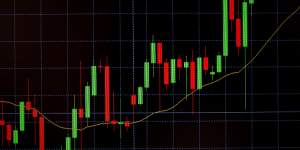Breaking news on stock market fluctuations today

Understanding stock market fluctuations involves recognizing how economic indicators, corporate news, and geopolitical events directly affect stock prices and investor sentiment, allowing for better navigation of market volatility.
Breaking news on stock market fluctuations often leaves many investors wondering how to respond. Have you ever felt overwhelmed by sudden changes? In this article, we’ll delve into factors influencing these fluctuations and strategies to help you stay ahead in the game.
Understanding stock market fluctuations
Understanding stock market fluctuations is crucial for anyone looking to make informed investment decisions. These fluctuations can significantly impact your portfolio, but they also present opportunities for savvy investors. By grasping the key concepts behind these changes, you can better navigate the market.
What Causes Fluctuations?
Several factors contribute to stock market fluctuations. Economic indicators, corporate earnings, and global events all play roles. For instance, when companies report higher earnings than expected, their stock prices may rise. Conversely, unexpected economic downturns can lead to drops in stock prices.
Key Factors Influencing Prices
Here are some major factors that influence stock prices:
- Economic Data: Reports on employment, inflation, and GDP can sway investor confidence.
- Interest Rates: Changes in interest rates affect borrowing costs, influencing business expansion and stock valuations.
- Market Sentiment: Investor psychology can drive market trends, often disconnected from actual company performance.
- Geopolitical Events: Global incidents, such as conflicts or trade disputes, can cause uncertainty and lead to price changes.
As you can see, many elements affect the stock market. Keeping an eye on these trends helps investors make timely decisions. With continuous monitoring, you can identify patterns and anticipate potential movements in the market, allowing you to seize opportunities.
Key factors influencing stock price changes
Understanding the key factors influencing stock price changes is essential for investors. Various elements contribute to how stocks move in the market. Identifying these influences can help you make better investment decisions.
Economic Indicators
Economic indicators play a vital role in determining stock prices. For example, inflation rates, employment figures, and GDP growth influence investor confidence. When economic data shows positive trends, stock prices often rise as investors feel optimistic about future growth.
Company Performance
The performance of individual companies directly impacts their stock prices. Factors such as earnings reports, revenue growth, and market competition are crucial. If a company reports higher earnings than expected, its stock price may surge. Conversely, poor performance can lead to price declines.
- Product Launches: New products can boost sales and attract investors.
- Management Changes: Leadership changes can create uncertainty but may also signify a fresh direction.
- Market Share Movements: Gaining or losing market share can influence investor perception and stock performance.
Market sentiment also affects stock prices. Often driven by investor emotions, the mood in the market can lead to price swings. For instance, fear or greed can cause rapid buying or selling. Staying informed about news and trends helps investors gauge market sentiment.
Additionally, external factors such as geopolitical events and regulatory changes have significant impacts on stock prices. Events like trade wars or natural disasters can disrupt supply chains and stocks may react swiftly to such news. Understanding these external influences is just as important as tracking individual companies.

Strategies for navigating market volatility
Having effective strategies for navigating market volatility is essential for any investor. Market fluctuations can be unsettling, but you can manage risk and make informed decisions with the right approach. There are various techniques you can adopt to protect your investments.
Diversify Your Portfolio
Diversification is one of the best strategies to reduce risk. By spreading your investments across different asset classes, such as stocks, bonds, and real estate, you can minimize the impact of a poor-performing asset. This way, a downturn in one area may not significantly harm your overall portfolio.
Stay Informed
Regularly monitoring market trends and news can help you make timely decisions. Being informed about economic indicators, corporate earnings, and geopolitical events allows you to react quickly. Following reputable financial news sources and analytical reports will keep you in the loop.
- Set Goals: Clearly define your financial goals to guide your investment choices.
- Use Stop-Loss Orders: Setting stop-loss orders can help limit losses by automatically selling stocks when they fall to a certain price.
- Consider Dollar-Cost Averaging: Investing a fixed amount regularly can help you buy more shares when prices are low and fewer when they are high.
Additionally, understand your risk tolerance. Knowing how much risk you can afford allows you to adjust your investment strategy during market fluctuations. If the market becomes volatile, you may decide to shift to more stable investments temporarily.
Lastly, consider seeking advice from financial professionals. They can provide valuable insights and strategies tailored to your situation. Their expertise can guide your decisions during turbulent times, helping you stay focused on your long-term objectives.
The role of news in stock market reactions
The role of news in stock market reactions is significant and cannot be overlooked. News events often trigger immediate responses from investors. Understanding how news affects the market can help you make better investment choices.
Market Sensitivity to News
Stocks tend to react quickly to news reports, whether they are good or bad. For instance, positive earnings reports can lead to stock price increases, while negative news about a company can result in drops. This sensitivity highlights the need for investors to stay updated on current events.
Types of News That Impact Stocks
Various types of news can influence stock prices:
- Economic Reports: Data such as unemployment rates and inflation indices can impact market confidence.
- Corporate Announcements: News about mergers, acquisitions, or product launches can greatly affect a company’s stock.
- Geopolitical Events: Events like elections, trade agreements, or conflicts can change market dynamics swiftly.
- Market Trends: Reports on broader market trends can shift investor sentiment and lead to collective movements in stock prices.
Moreover, the speed of news dissemination plays a crucial role. In today’s digital age, news spreads rapidly via social media and financial news platforms. This immediacy means that investors must react quickly to avoid losses or capitalize on gains.
Investors must also consider the credibility of the news source. Reliable information can provide valuable insights, while unverified or sensationalized reports may lead to poor decisions. Always seek out credible news sources to inform your investment strategy. By doing so, you can navigate the market more effectively during volatile periods.
In conclusion, understanding the stock market requires recognizing the forces that drive stock price changes. From economic indicators to corporate news, many factors influence how stocks react. By applying effective strategies such as diversification and staying informed, investors can navigate market volatility with confidence. Keeping an eye on credible news sources helps in making timely and smart investment choices.
FAQ – Frequently Asked Questions about Stock Market Fluctuations
What causes stock market fluctuations?
Stock market fluctuations are caused by various factors, including economic data, company earnings, and geopolitical events.
How can news impact stock prices?
News can cause immediate reactions in the market, influencing investor sentiment and stock prices based on positive or negative reports.
What strategies can help in volatile markets?
Diversifying your portfolio, staying informed on market trends, and setting financial goals are effective strategies to manage volatility.
Why is it important to use credible news sources?
Credible news sources provide reliable information, which is crucial for making informed investment decisions and avoiding bad choices.







